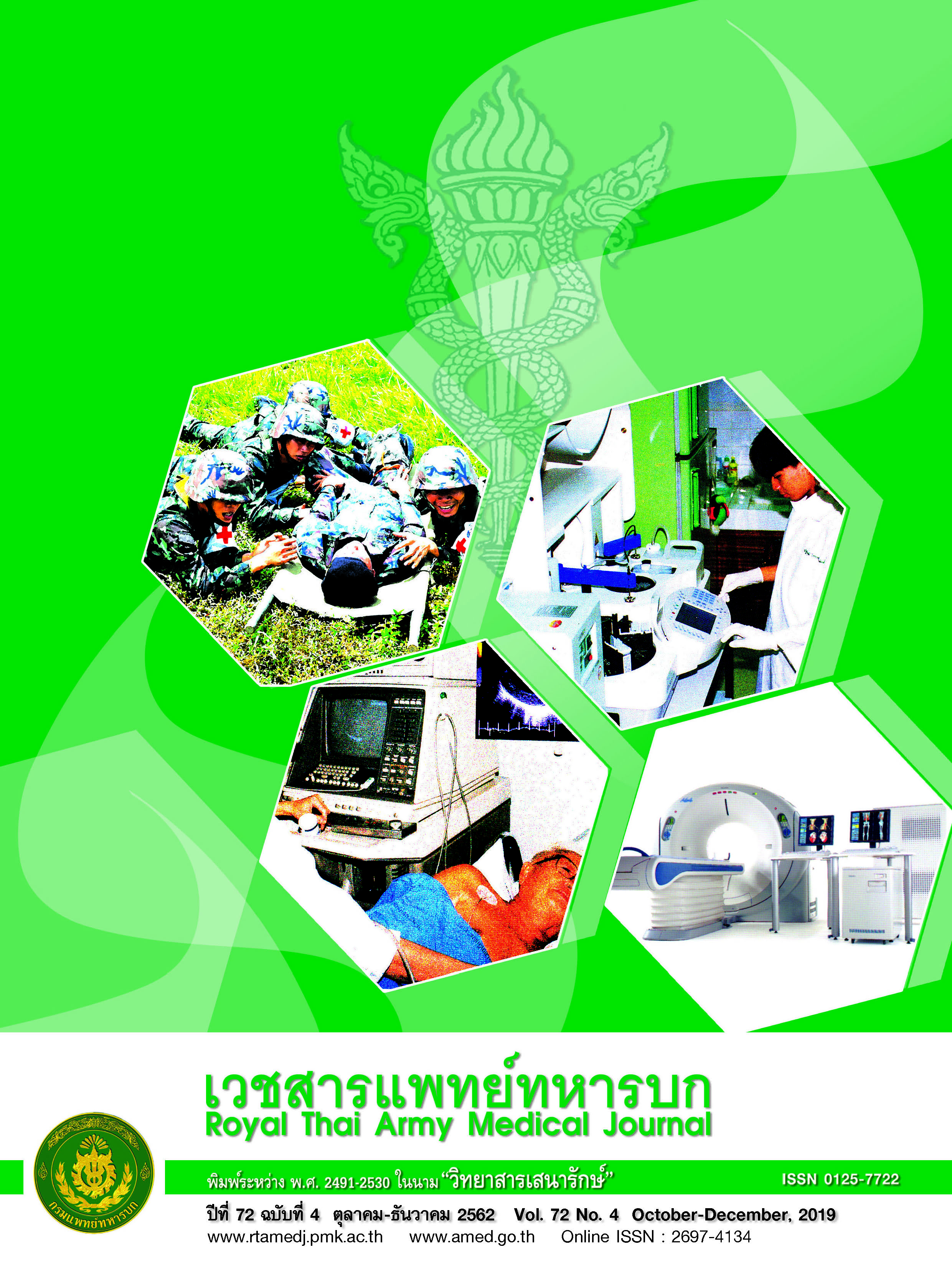ลักษณะกรอบความคิดของนักเรียนชั้นประถมศึกษาปีที่ 6 และความสัมพันธ์กับผลสัมฤทธิ์ทางการเรียนและ ความสุขในการเรียน
Main Article Content
บทคัดย่อ
บทนำ กรอบความคิด (mindset) เป็นความเชื่อที่ส่งผลต่ออารมณ์และพฤติกรรม กรอบความคิดมี 2 ลักษณะ คือ กรอบความคิดแบบตายตัว (fixed mindset) เชื่อว่าความฉลาดคงที่ และกรอบความคิดแบบเติบโต (growth mindset) เชื่อว่าความฉลาดพัฒนาได้ หลายการศึกษาพบว่ากรอบความคิดแบบเติบโตมีผลต่อความสำเร็จในการเรียนและความสุข แต่การศึกษาเกี่ยวกับกรอบความคิดในนักเรียนชั้นประถมศึกษายังมีอยู่อย่างจำกัด
วัตถุประสงค์ เพื่อศึกษาลักษณะกรอบความคิดของนักเรียนระดับชั้นประถมศึกษาปีที่ 6 และเปรียบเทียบความสัมพันธ์ของกรอบความคิด กับคะแนนการทดสอบทางการศึกษาระดับชาติขั้นพื้นฐาน (O-NET) และคะแนนความสุขในการเรียน
วิธีการวิจัย การศึกษาแบบตัดขวางเชิงวิเคราะห์ ในนักเรียนชั้นประถมศึกษาปีที่ 6 ในช่วงเวลา ธันวาคม 2560 ถึง เมษายน 2561 นักเรียนและผู้ปกครองที่สมัครใจเข้าร่วมงานวิจัย ตอบแบบสอบถามเกี่ยวกับข้อมูลพื้นฐาน กรอบความคิด และความสุขในการเรียน เมื่อจบปีการศึกษาทำการรวบรวมคะแนนการทดสอบทางการศึกษาระดับชาติขั้นพื้นฐาน 4 วิชา (คณิตศาสตร์ วิทยาศาสตร์ ภาษาไทย และภาษาอังกฤษ) จากนั้นนำข้อมูลที่ได้มาวิเคราะห์ทางสถิติ โดยใช้สถิติเชิงพรรณนา การวิเคราะห์ความแปรปรวนทางเดียวและทดสอบความแตกต่างรายคู่ และการวิเคราะห์การถดถอยอย่างง่าย
ผลการวิจัย ผู้เข้าร่วมงานวิจัย 441 คน โดยจำแนกเป็น กลุ่มกรอบความคิดแบบเติบโตร้อยละ 56 กลุ่มกรอบความคิดเเบบไม่ชัดเจนร้อยละ 38 และกลุ่มกรอบความคิดแบบตายตัวร้อยละ 6 และ จากการศึกษาพบว่า กลุ่มกรอบความคิดแบบเติบโตมีความสัมพันธ์กับคะแนนการทดสอบทางการศึกษาระดับชาติขั้นพื้นฐานและคะแนนความสุขในการเรียนที่มากกว่าอย่างมีนัยสำคัญทางสถิติ (P<0.05) โดยกรอบความคิดมีค่าสหสัมพันธ์ที่ต่ำกับคะแนนความสุขในการเรียน (b 0.529, adjust R2 0.278, p < 0.001) และมีค่าสหสัมพันธ์ที่ต่ำมากกับคะแนนรวมการทดสอบทางการศึกษาระดับชาติขั้นพื้นฐาน (b 0.173, adjust R2 0.028, p < 0.001). เมื่อควบคุมตัวแปรอื่นๆให้คงที่พบว่ากรอบความคิดสามารถทำนายคะแนนรวมการทดสอบทางการศึกษาระดับชาติขั้นพื้นฐานได้ร้อยละ 3 และสามารถทำนายคะแนนความสุขในการเรียนได้ร้อยละ 28
สรุป นักเรียนระดับชั้นประถมศึกษาปีที่ 6 พบสัดส่วนของกลุ่มกรอบความคิดแบบเติบโตมากที่สุด กลุ่มกรอบความคิดแบบเติบโตมีความสัมพันธ์กับคะแนนการทดสอบทางการศึกษาระดับชาติขั้นพื้นฐานและคะแนนความสุขในการเรียนที่มากกว่าอย่างมีนัยสำคัญทางสถิติ โดยกรอบความคิดมีค่าสหสัมพันธ์ที่ต่ำกับคะแนนความสุขในการเรียนและมีค่าสหสัมพันธ์ที่ต่ำมากกับคะแนนรวมการทดสอบทางการศึกษาระดับชาติขั้นพื้นฐาน
Downloads
Article Details
บทความในวารสารนี้อยู่ภายใต้ลิขสิทธิ์ของ กรมแพทย์ทหารบก และเผยแพร่ภายใต้สัญญาอนุญาต Creative Commons Attribution-NonCommercial-NoDerivatives 4.0 International (CC BY-NC-ND 4.0)
ท่านสามารถอ่านและใช้งานเพื่อวัตถุประสงค์ทางการศึกษา และทางวิชาการ เช่น การสอน การวิจัย หรือการอ้างอิง โดยต้องให้เครดิตอย่างเหมาะสมแก่ผู้เขียนและวารสาร
ห้ามใช้หรือแก้ไขบทความโดยไม่ได้รับอนุญาต
ข้อความที่ปรากฏในบทความเป็นความคิดเห็นของผู้เขียนเท่านั้น
ผู้เขียนเป็นผู้รับผิดชอบต่อเนื้อหาและความถูกต้องของบทความของตนอย่างเต็มที่
การนำบทความไปเผยแพร่ซ้ำในรูปแบบสาธารณะอื่นใด ต้องได้รับอนุญาตจากวารสาร
เอกสารอ้างอิง
2. Gutman LM, Schoon I. The impact of non-cognitive skills on outcomes for young people. London: Education Endowment Foundation; 2013.
3. Dweck CS, Master A. Self-relations, self-esteem, self-care, and self-control. In: Carey WB, Crocker AC, Coleman WL, Elias ER, Feldman HM, editors. Developmental-behavioral pediatrics. 4th ed. philadelphia: Saunders Elsevier; 2009. p. 427-35.
4. Dweck CS. Self- theories: their role in motivation, personality, and development. New york: Psychology press; 2000.
5. Dweck CS. Mindset the new psychology of success. New york: Ballantine book; 2008.
6. Dweck CS, Leggett EL. A social-cognitive approach to motivation and personality. Psychol Rev. 1988;95(2):256-73.
7. Blackwell LS, Trzesniewski KH, Dweck CS. Implicit theories of intelligence predict achievement across and adolescent transition: a longitudinal study and an intervention. child Dev. 2007;78(1):246-63.
8. Romero C, Master A, Paunesku D, Dweck CS, Gross JJ. Academic and emotional functioning in middle school: the role of implicit theories. Emotion. 2014;14(2):227-34.
9. Stipek D, Gralinski-Bakker JH. Children's beliefs about intelligence and school performance. J Educ Psychol. 1996;88(3):397-407.
10. Claro S, Paunesku D, Dweck CS. Growth mindset tempers the effects of poverty on academic achievement. Proc Natl Acad Sci U S A. 2016;113(31):8664-8.
11. Costa A, Faria L. Implicit Theories of Intelligence and Academic Achievement: A Meta-Analytic Review. Front Psychol. 2018;9:829.
12. Aronson J, Fried CB, Good C. Reducing the Effects of Stereotype Threat on African American College Students by Shaping Theories of Intelligence. J Exp Soc Psychol. 2001;38(2):113-25.
13. Good C, Aronson J, Inzlicht M. Improving adolescents' standardized test performance: An intervention to reduce the effects of stereotype threat. J Appl Dev Psychol. 2003;24(6):645-62.
14. Paunesku D, Walton GM, Romero C, Smith EN, Yeager DS, Dweck CS. Mind-set interventions are a scalable treatment for academic underachievement. Psychol Sci. 2015;26(6):784-93.
15. Yeager DS, Romero C, Paunesku D, Hulleman CS, Schneider B, Hinojosa C, et al. Using Design Thinking to Improve Psychological Interventions: The Case of the Growth Mindset During the Transition to High School. J Educ Psychol. 2016;108(3):374-91.
16. Jegathesan M, Vitberg YM, Pusic MV. A survey of mindset theories of intelligence and medical error self-reporting among pediatric housestaff and facculty. BMC med educ. 2016;16(58):1-6.
17. Ivens J. The Development of a Happiness Measure for Schoolchildren. Educ Psychol Pract. 2007;23(3):221-39.
18. Second language learning In: Lightbown PM, Spada N, editors. How languages are learned. Oxford: Oxford university press; 2013. p. 35-122.
19. King RB. Fixed mindset leads to negative affect: The relations between implicit theories of intelligence and subjective well-being. Z Psychol. 2017;225(2):137-45.


